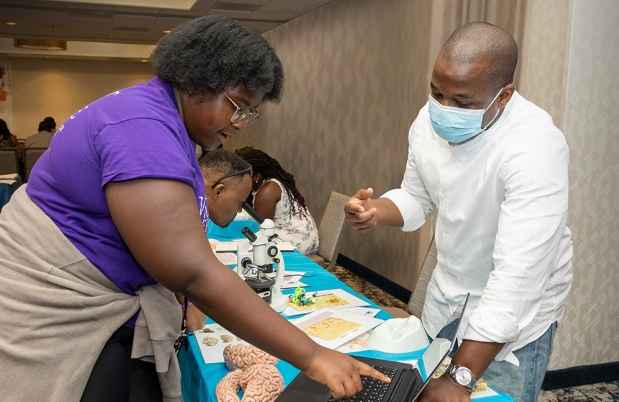“There’s a strange part of us that likes this kind of work, but it doesn’t have to lead to depression and alcoholism. It doesn’t have to be a life sentence.”
These are the words of Wayne Torres, a captain at the Bristol County (Massachusetts) Sheriff’s Office, who is in recovery from an addiction to alcohol. Torres offered those thoughts to an audience of corrections officers and other staff members during a daylong series of meetings at the Maine State Prison (MSP) on November 13. At the meetings, Torres and others shared personal stories about the toll that corrections work can take on the lives of those in the industry. The meetings also highlighted the need for peer support and increased awareness of mental health issues.
According to Amanda Seirup, PsyD, a clinical psychologist working as clinical supervisor with Wellpath/Maine Department of Corrections, the day was part of an ongoing effort to provide “attention and care” to staff at MSP. “Studies have shown that staff working in the U.S. correctional system have higher rates of PTSD, depression, anxiety, and suicide than the typical citizen,” Seirup said. “Not only is the individual affected by these mental health issues, but that individual’s relationships are affected too. Divorce rates are high, and everyone that the staff person interacts with is affected by these effects of work-related stress.”
Moreover, she said, “Physical health is affected, with individuals facing issues such as chronic back, neck, and knee pain, high blood pressure, heart disease, diabetes, high cholesterol, and early death. The staff at Maine State Prison are not immune to these statistics. We have a problem, and I believe that it is our responsibility to address it.”
The first step in addressing these issues was an initiative toward staff wellness launched by the Maine Department of Corrections commissioner. This work led to the forming of a partnership between the prison and McLean Hospital. Last year, corrections officers and staff members shared their stories as part of McLean’s Deconstructing Stigma campaign. The partnership continued with two town hall-style presentations in March where staff from McLean provided information on various topics related to mental illness, substance use, and health/wellness to MSP staff.
Staff reaction to the town halls, Seirup said, led to the development of the November sessions.
“Some of the feedback was that the town hall meetings were too large, and some staff weren’t comfortable asking questions in such a large group,” she stated. “These recent meetings were organized simply to care for our staff and attend to the needs that so often go unmet in this field.”

To encourage audience engagement, Seirup and her colleagues developed a series of small group meetings. They also brought in speakers the prison staffers could relate to—individuals who work in the field and could share their problems, frustrations, and triumphs.
The November sessions featured Kelly Scanlon, LICSW, a social worker at McLean Hospital with experience working at the Middlesex prison in Massachusetts and a psychiatric hospital in Bridgewater, Massachusetts. Scanlon explained that she had always experienced anxiety, but her issues got worse when she took high-stress jobs in correctional and psychiatric facilities. “I started having panic attacks on the job,” she said. Off work, she became hypervigilant, always on guard for potential assault or abuse no matter where she was.
Scanlon continues to work in a high-pressure field. She discussed her attraction to these jobs—the constant challenges, “the dark humor and sharing of stories and jokes with co-workers”—but she emphasized the need to take care of yourself.
Torres also recounted the toll that high-stress work took on his life. He explained that he started in corrections in his early 20s. As he moved up the ranks, he developed a serious problem with alcohol.
The problem, he said, stemmed from several factors. Like most corrections officers, Torres faced “forced overtime, stress, low pay, suicides, violence, verbal abuse, and threat of attacks.” At the same time, he enjoyed the challenges of the job, and it began to take up more and more of his life. He went to bars with his coworkers and hung out with them on weekends and vacations. They shared stories, complaints, and dark humor about life at the prison. “You want to be a part of it,” he stated. “You can’t get away from it.”
Over time, drinking took over more of his life too. “Drinking went from something social to something I needed,” he said. “I was bitter, angry. I wasn’t the best version of myself.”
In time, Torres’ excessive drinking led him to seek treatment. It was a harrowing experience. He hallucinated, spent nine days in a coma, and nearly died. As he got better, he joined the LEADER program at McLean. Designed to address the unique mental health needs of police officers, firefighters, military personnel, first responders, and others, LEADER allowed Torres to interact with people with similar backgrounds who had faced similar challenges.
When he returned to his prison job, Torres led an effort to set up a “stress unit,” designed to help corrections workers facing substance use or mental health issues. “When I went back to work, I wanted to make up for last time,” Torres explained. “I wanted to help COs look out for themselves and look out for each other.”
The Peer Support Team at MSP is much like the stress unit that Torres created in Massachusetts. Staff members who have been involved in a traumatic incident at the prison or who need help with a personal problem or mental health issue can call on the team for support.
Seirup said that MSP staffers have reacted positively to the November 13 meetings, along with the Peer Support Team and other mental health efforts at the prison. In particular, she said, prison staff have appreciated the opportunity to hear from others in the field.
“It’s important for correctional staff to hear that their peers—sometimes the toughest, most respected—also have struggles,” she said. “The validation that comes with hearing someone else’s story can be lifesaving.”
Media Requests
Journalist or member of the media? We are available 24/7 for media requests.



